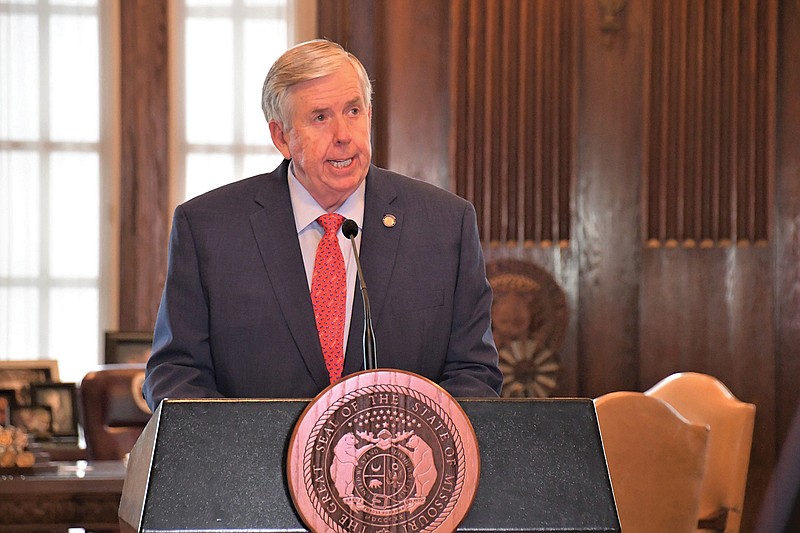Gov. Mike Parson and his administration talked Thursday about the importance of getting students learning in-person again in the fall and released health guidance and funding with the intent of making that happen.
On Thursday, Lincoln University followed suit and announced the campus will reopen to the public July 20, though "Masks will be required and social distancing will be maintained" amid the COVID-19 pandemic.
The Jefferson City campus has been open to employees since May 4. Though it was announced earlier this week the Lincoln Class of 2020's graduation ceremony will be virtual, LU does plan to offer in-person classes in the fall, with the semester scheduled to begin Aug. 24.
Colleges and universities such as LU will be receiving much of the approximately $125 million in Coronavirus Aid, Relief and Economic Security Act funding so they can safely reopen in the fall, Parson and Missouri Higher Education Commissioner Zora Mulligan announced Thursday.
Mulligan said $80 million is available for colleges and universities to spend on needs including the purchase of personal protective equipment, the modification of physical spaces and testing.
Colleges and universities "understand the importance of bringing people back to campus and really value the experiences that represents," Mulligan said.
She encouraged fresh high school graduates to stick to their original plans and avoid deferring college for a year.
However, Mulligan said, another $10 million in CARES Act funding will be available for colleges and universities to expand remote learning capabilities.
Harris-Stowe State University was another Missouri institution that announced reopening plans Thursday. Those plans included remotely-conducted classes for the last three weeks of the fall semester and three models of online classes.
Mulligan said another $23 million will be available for institutions to be sure they have the faculty and staff they need.
Mulligan said CARES Act funding for colleges and universities "has to be administered on a reimbursement basis," meaning, "Institutions will be required to demonstrate to us that they have spent the money on permissible purposes, and then we'll be able to reimburse them."
She added another $9.7 million will be available for workforce development - including $6.7 million for job training - $2 million for information technology training and $1 million for the state's "Fast Track" program to encourage adults to earn a post-high school degree.
Meanwhile, the Department of Health and Senior Services and Department of Elementary and Secondary Education also released Thursday "further school reopening guidance that aims to provide additional clarity and consistency for Missouri school leaders and public health officials as they make decisions about school reopening strategies at the local level."
The five-page question-and-answer-style document states, "There are no statewide health mandates related to K-12 school reopening being issued at this time. There may, however, be local ordinances that school leaders and health officials should keep in mind when making plans to reopen schools."
The guidance includes topics such as how to screen students, staff and visitors for COVID-19, where and how to implement physical distancing measures, and whether face masks or coverings should be used.
"Young children may have difficulty complying with the proper use of face coverings and may have increased face touching, mask chewing, mask trading, and other behavior that could increase risk of infection. For this reason, continuous usage of face coverings is not recommended for young children," according to the state's guidance.
Masks are more appropriate as an additional layer of protection for older children, such as those in middle and high school, according to the state's guidance, but "Face coverings should be considered for all age groups during periods when students are not cohorted or cannot physically distance," such as in hallways or at the start or end of the school day.
The state's guidance adds, "it is also appropriate for all students to wear masks or face coverings while riding the bus." It's also recommended that school staff be required to wear face coverings.
Parson said Thursday he's confident the guidance will provide what's needed to safely reopen schools in the fall.
"I don't think there's any question in the state of Missouri, we've got to get the schools opened back up. We've got to get kids back in school. There's a lot of things that occur by not having school that could be far worse than going in there and fighting the virus," Parson said.
He said schools are "highly encouraged" to "do whatever they can" to get students back in classrooms.
DHSS Director Dr. Randall Williams on Thursday said an autoimmune inflammatory disease in children that's suspected to be connected to exposure to COVID-19 is incredibly rare, citing that - at least at one time - there had only been approximately 130 cases in the U.S.
The University of Michigan reported on May 14 that, as of that date, "there were more than 100 cases in at least 14 states." A June 29 article in the New England Journal of Medicine reported a study that had found 186 patients with the condition March 15-May 20 in pediatric health centers across the country.
Williams said there's no doubt the condition can be fatal, but "the vast majority of children in America are not going to have that issue."
He also on Thursday urged young adults to wear masks if they are not going to practice social distancing, as infections among that age group that are driving case increases could lead to increased infections among more at-risk groups of people.

